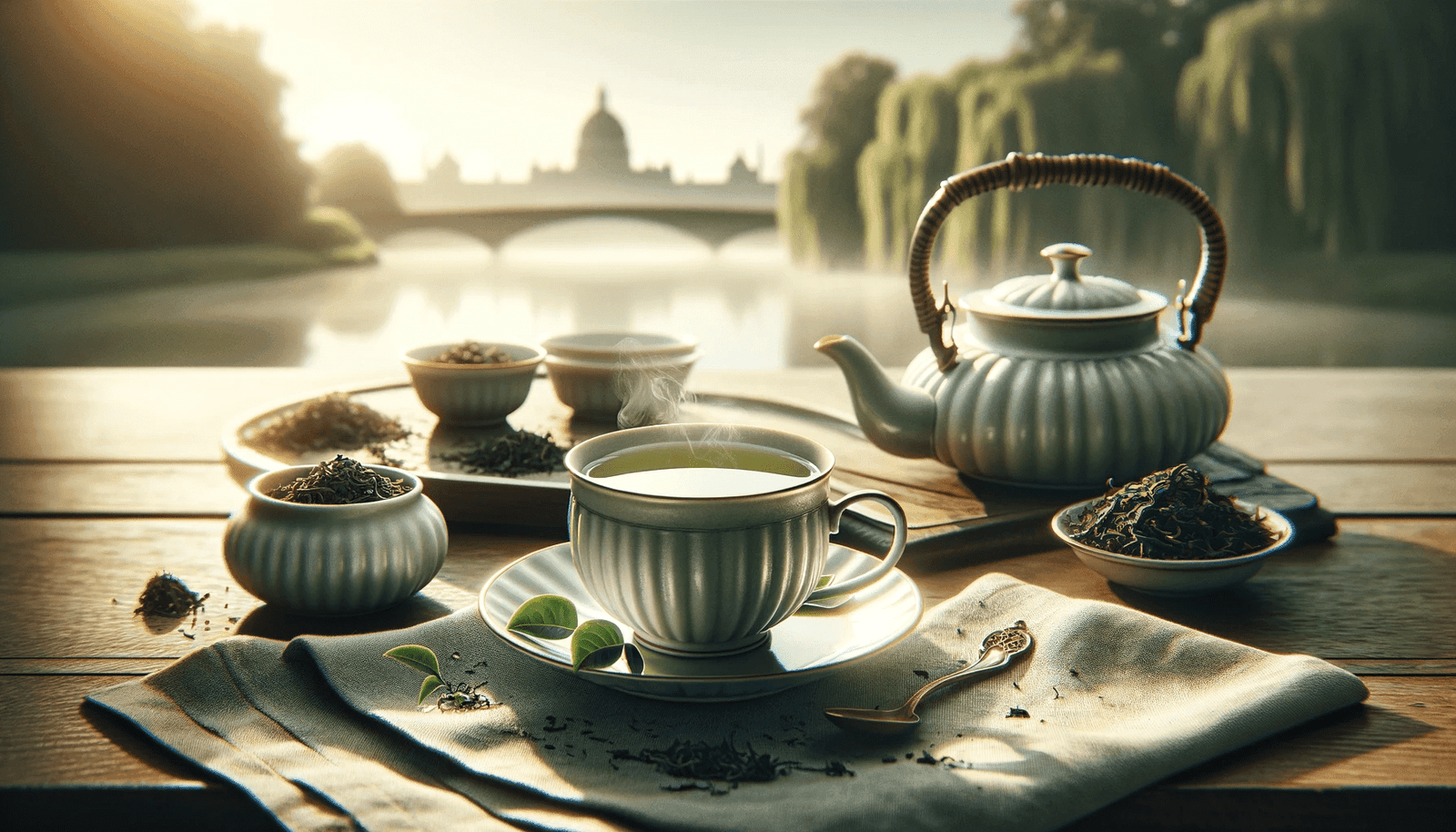White tea, known for its delicate taste and many health benefits, is a real specialty among teas. However, there are also many myths and half-truths surrounding the tea. The question often arises: does white tea contain caffeine? The short answer is yes. However, the caffeine content in white tea depends on many factors. The widespread assumption that white tea is caffeine-free or contains very little caffeine is not only wrong… some types of white tea are actually among the most caffeine-rich types of tea.

Inhalt
ToggleWhat influences the caffeine content of white tea?
The caffeine content in tea is influenced by many different factors. To understand how much caffeine ends up in your cup of white tea, we need to look at the different factors:
- The variety of the tea plant
- The age of the leaves
- The production
- The preparation
How the Variety Influences the Caffeine Content
The variety of the tea plant has a significant influence on the caffeine content of the tea produced from it. Put simply, two different varieties of the Camellia Sinensis tea plant are mainly used. The leaves of the Sinensis variety are usually used for white tea. Compared to teas made from the Assamica variety (e.g. black tea and some green teas), Sinensis teas tend to have a low caffeine content. However, this only applies to the older, larger leaves of the plant…
White tea from young leaves contains more caffeine
The second, much more relevant factor is the age of the leaves. The tea plant produces caffeine as a defense against insects. The tender, young leaves are the most susceptible to insect bites, so they contain the most caffeine. And this is the main reason why white tea contains high levels of caffeine. Only the youngest leaves and even the leaf buds are used for the higher-quality varieties of white tea. This applies in particular to the Yin Zhen Silver Needles and Pai Mu Tan (Peony / White Peony) varieties.
How Production Affects how much Caffeine White Tea Contains
Many factors in the production process can influence the caffeine content. Mainly roasting and oxidization. In contrast to Oolong, green or black tea, the leaves for white tea are neither oxidized nor roasted and thus tend to contain more caffeine. After harvesting the tender leaves and buds, usually by hand, they are carefully processed in order to preserve the natural properties of the leaves.
How you can Influence the Caffeine Content of your Cup of White Tea
The last and most decisive variable that influences how much caffeine is in white tea is the preparation. Here you have control over how much caffeine ends up in your cup. In addition to the quantity of tea leaves, temperature and brewing time play a decisive role. The longer and hotter you infuse the white tea, the more ingredients are extracted. Most varieties of white tea can be brewed from 70-75 degrees. If you want a stronger taste and caffeine content, you can increase the temperature to 80-90 degrees.
You can infuse white tea made from loose leaves at least three times. The caffeine does not completely dissolve from the leaves with the first infusion, i.e. the subsequent infusions still contain caffeine.

- Guaranteed Quality and Freshness
- Secure Payment
- Fast Shipping
Tobias
Caffeine in Different Types of White Tea
Now you know what determines the caffeine content of white tea and how you can influence it yourself by preparing it. In the following overview you can see how much caffeine is usually contained in the two most popular types of white tea. The amount indicated is the maximum caffeine content that you can extract if you brew white tea at 100 degrees and leave it to infuse for at least 4 minutes. At a temperature of 60 degrees and a brewing time of 2 minutes, this value is roughly halved.
- Silvery Needle / Yin Zhen: 146 mg for 2 teaspoons (3g)
- White Peony / Pai Mu Tan: 115 mg for 2 teaspoons (3g)
Comparison with Other Tea Varieties
With these values, white tea is one of the most caffeinated teas. Green tea can contain a similar amount of caffeine (especially Japanese shade teas such as Gyokuro and the Chinese green teas Green Needles and Mao Feng). However, there are also many green teas that contain significantly less. Matcha, on the other hand, where the whole leaves are ground and dissolved in the drink, contains around 136 mg of caffeine per 4 g of powder.
The varieties with less caffeine include oolong tea (58 – 72 mg) and black tea (31 – 96 mg). For comparison: coffee contains 45 – 100 mg of caffeine. You can find a complete overview of the caffeine content in teas in my article High Caffeine Tea – What Tea has the Most Caffeine?
Conclusion
The question “Does White Tea Contain Caffeine” can therefore be answered with a definite yes. By selecting the youngest leaves and buds and processing them gently, white tea is one of the teas with the highest caffeine content, comparable to matcha. Strongly brewed white tea, with high temperatures and a long brewing time, contains even more caffeine than coffee.
White tea is therefore not only a very tasty stimulant, but also boasts a high content of health-promoting ingredients. The effect of white tea on the body, particularly on the cardiovascular system, is an aspect that fascinates both tea drinkers and researchers.
FAQ: White tea caffeine
Yes, white tea contains caffeine. The amount varies depending on the type of tea and how it is prepared. White tea tends to have a lot of caffeine, especially if it is made from very young leaves or buds (e.g. Silver Needle).
White tea can contain similar or even higher amounts of caffeine than black tea, especially when young leaves and buds are used. However, the exact caffeine content depends on the variety and preparation.
White tea can contain similar or even higher amounts of caffeine than black tea, especially when young leaves and buds are used. However, the exact caffeine content depends on the variety and preparation.
Depending on the variety, white tea can contain high levels of caffeine, which could affect sleep in sensitive people. The caffeine content can be reduced by shorter brewing times and lower temperatures.
The amount of caffeine in white tea varies, but can be up to 146 mg per cup. This depends on the variety and preparation.
White tea has a mild stimulating effect due to its caffeine content. Thanks to the combination of caffeine and theanine, it generally produces a relaxed alertness and focus.


